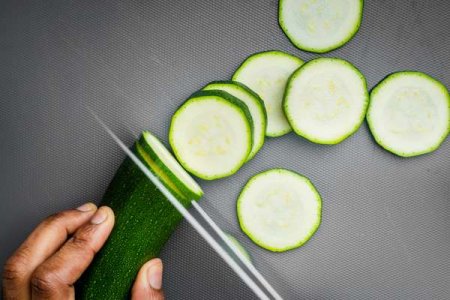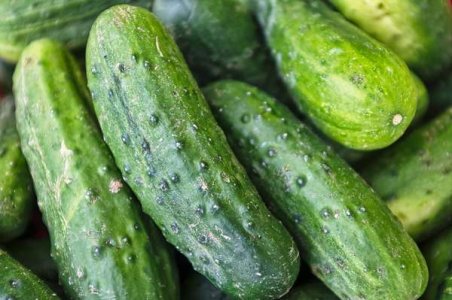The truth about cucumbers: Are they actually healthy?
- Replies 0
Crisp, cool, and endlessly versatile, cucumbers have been gracing our plates—and spa days—for thousands of years.
But are these green wonders really as healthy as they seem, or are they just water in a fancy package? Here at The GrayVine, we’re slicing through the myths and serving up the facts, with a dash of fun and a sprinkle of science.
So, before you toss another cucumber into your salad or slap a couple of slices on your eyes, let’s find out what the experts really say about cucumbers and your health.
Cucumber: Fruit, Vegetable, or Both?
Let’s settle the age-old debate: is the cucumber a fruit or a vegetable? Botanically, cucumbers are fruits because they develop from the flower of the plant and contain seeds.
But in the kitchen, they’re treated as vegetables—think savory salads, crunchy snacks, and the star of the pickle jar. Cucumbers belong to the gourd family (Cucurbitaceae), rubbing shoulders with pumpkins, melons, squash, and zucchini.
With over 750 species in the family, cucumbers are in good company!
You’ll find several types of cucumbers at your local market:

Nutritional Powerhouse or Just Water?
It’s true—cucumbers are about 95% water, making them one of the most hydrating foods you can eat. But don’t let their high water content fool you into thinking they’re nutritionally empty. A medium cucumber (with the peel) is a mini-multivitamin, offering:
- Vitamin K (for blood clotting and bone health)
- Vitamin C (for immune support and glowing skin)
- Potassium (for healthy blood pressure and muscle function)
- Magnesium, calcium, zinc, manganese, and phosphorus
- Over 1 gram of dietary fiber
- About 1.3 grams of protein
- Only 30 calories!
That’s a lot of goodness packed into a crunchy, refreshing package.
Also read: Jessica Simpson shares bizarre wellness habit—and it’s not what you think…
Antioxidants and Beyond: The Secret Superpowers of Cucumbers
Cucumbers are rich in antioxidants, including flavonoids and tannins, which help fight inflammation and may even lower your risk of chronic diseases like heart disease and cancer.
Some studies suggest cucumbers may help regulate blood sugar and reduce cholesterol, making them a smart choice for those watching their metabolic health.
And let’s not forget their role in digestive health. Thanks to their fiber and water content, cucumbers can help keep things moving smoothly—nature’s gentle remedy for constipation.
Plus, their low calorie count makes them a dieter’s dream, offering satisfying crunch without the guilt.

Cucumbers for Skin: Not Just a Spa Gimmick
Ever wondered why cucumbers are a spa staple? It’s not just for show.
Cucumber extracts have soothing, anti-inflammatory properties that can help reduce swelling, irritation, and even sunburn. Next time you’re feeling puffy-eyed, those cucumber slices might just do the trick!
Are There Any Downsides?
For most people, cucumbers are a safe and healthy addition to the diet. But, as with all things, moderation is key.
Cucumbers contain compounds called cucurbitacins, which can cause stomach upset in large amounts—think nausea or diarrhea. If you have a sensitive stomach or a history of digestive issues, you might want to start slow.
Also read: Unlock the secret to better health: What you need to know about lymphatic massages
A few other groups should be cautious:
Ready to add more cucumbers to your life? Here are some tasty ideas:
- Slice them into salads or sandwiches for extra crunch.
- Dip them in hummus or Greek yogurt for a healthy snack.
- Add them to water with lemon and mint for a refreshing drink.
- Try them in cold soups like gazpacho.
- Make your own pickles—easy, fun, and delicious!
A Few Fun Facts to Impress Your Friends
- The phrase “cool as a cucumber” isn’t just a saying—cucumbers can be up to 20 degrees cooler inside than the outside air!
- Ancient Egyptians ate cucumbers for their cooling properties and even used them in skincare.
- The world’s longest cucumber was over 42 inches long—now that’s a salad!
Read next: Are you eating the riskiest foods in America? Here’s what you need to know—without panicking

Are you a cucumber connoisseur, or do you prefer your veggies with a little more bite? Have you tried any unique cucumber recipes, or do you swear by cucumber slices for puffy eyes? Share your stories, tips, and questions in the comments below!
But are these green wonders really as healthy as they seem, or are they just water in a fancy package? Here at The GrayVine, we’re slicing through the myths and serving up the facts, with a dash of fun and a sprinkle of science.
So, before you toss another cucumber into your salad or slap a couple of slices on your eyes, let’s find out what the experts really say about cucumbers and your health.
Cucumber: Fruit, Vegetable, or Both?
Let’s settle the age-old debate: is the cucumber a fruit or a vegetable? Botanically, cucumbers are fruits because they develop from the flower of the plant and contain seeds.
But in the kitchen, they’re treated as vegetables—think savory salads, crunchy snacks, and the star of the pickle jar. Cucumbers belong to the gourd family (Cucurbitaceae), rubbing shoulders with pumpkins, melons, squash, and zucchini.
With over 750 species in the family, cucumbers are in good company!
You’ll find several types of cucumbers at your local market:
- Slicing cucumbers: Large, thick-skinned, and perfect for fresh eating.
- Pickling cucumbers: Small, bumpy, and built for brine.
- Seedless or “burpless” cucumbers: Thin-skinned, fewer seeds, and easier on the tummy.

Cucumbers are technically fruits, though in the US they're commonly eaten and regarded as vegetables due to their savory flavor and use in meals. Image source: Louis Hansel / Unsplash.
Nutritional Powerhouse or Just Water?
It’s true—cucumbers are about 95% water, making them one of the most hydrating foods you can eat. But don’t let their high water content fool you into thinking they’re nutritionally empty. A medium cucumber (with the peel) is a mini-multivitamin, offering:
- Vitamin K (for blood clotting and bone health)
- Vitamin C (for immune support and glowing skin)
- Potassium (for healthy blood pressure and muscle function)
- Magnesium, calcium, zinc, manganese, and phosphorus
- Over 1 gram of dietary fiber
- About 1.3 grams of protein
- Only 30 calories!
That’s a lot of goodness packed into a crunchy, refreshing package.
Also read: Jessica Simpson shares bizarre wellness habit—and it’s not what you think…
Antioxidants and Beyond: The Secret Superpowers of Cucumbers
Cucumbers are rich in antioxidants, including flavonoids and tannins, which help fight inflammation and may even lower your risk of chronic diseases like heart disease and cancer.
Some studies suggest cucumbers may help regulate blood sugar and reduce cholesterol, making them a smart choice for those watching their metabolic health.
And let’s not forget their role in digestive health. Thanks to their fiber and water content, cucumbers can help keep things moving smoothly—nature’s gentle remedy for constipation.
Plus, their low calorie count makes them a dieter’s dream, offering satisfying crunch without the guilt.

They’re low in calories, high in water, and packed with nutrients like vitamin K, vitamin C, potassium and antioxidants, all of which can support hydration, healthy digestion, blood pressure and immune function. Image source: Eric Prouzet / Unsplash.
Cucumbers for Skin: Not Just a Spa Gimmick
Ever wondered why cucumbers are a spa staple? It’s not just for show.
Cucumber extracts have soothing, anti-inflammatory properties that can help reduce swelling, irritation, and even sunburn. Next time you’re feeling puffy-eyed, those cucumber slices might just do the trick!
Are There Any Downsides?
For most people, cucumbers are a safe and healthy addition to the diet. But, as with all things, moderation is key.
Cucumbers contain compounds called cucurbitacins, which can cause stomach upset in large amounts—think nausea or diarrhea. If you have a sensitive stomach or a history of digestive issues, you might want to start slow.
Also read: Unlock the secret to better health: What you need to know about lymphatic massages
A few other groups should be cautious:
- Allergies: If you’re allergic to other gourds (like melons or squash), watch out for cucumber reactions.
- Blood disorders: Cucumbers have anti-platelet properties, which could interact with blood-thinning medications.
- Kidney issues: If you’re on a potassium-restricted diet, check with your doctor before loading up on cucumbers.
Ready to add more cucumbers to your life? Here are some tasty ideas:
- Slice them into salads or sandwiches for extra crunch.
- Dip them in hummus or Greek yogurt for a healthy snack.
- Add them to water with lemon and mint for a refreshing drink.
- Try them in cold soups like gazpacho.
- Make your own pickles—easy, fun, and delicious!
A Few Fun Facts to Impress Your Friends
- The phrase “cool as a cucumber” isn’t just a saying—cucumbers can be up to 20 degrees cooler inside than the outside air!
- Ancient Egyptians ate cucumbers for their cooling properties and even used them in skincare.
- The world’s longest cucumber was over 42 inches long—now that’s a salad!
Read next: Are you eating the riskiest foods in America? Here’s what you need to know—without panicking
Key Takeaways
- Cucumbers are technically fruits, though in the US they're commonly eaten and regarded as vegetables due to their savory flavor and use in meals.
- They’re low in calories, high in water, and packed with nutrients like vitamin K, vitamin C, potassium and antioxidants, all of which can support hydration, healthy digestion, blood pressure and immune function.
- The fiber and water in cucumbers help with weight management and may relieve constipation, while cucumber extracts are also used to soothe skin irritation and sunburn.
- Most people can safely enjoy cucumbers daily, but those with allergies to gourds, kidney issues, blood-clotting disorders or on certain medications should take care, as cucumbers can rarely cause digestive discomfort or interact with specific medicines.
Are you a cucumber connoisseur, or do you prefer your veggies with a little more bite? Have you tried any unique cucumber recipes, or do you swear by cucumber slices for puffy eyes? Share your stories, tips, and questions in the comments below!






